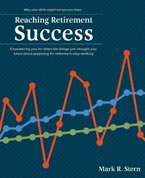June 7, 2013
Reaching Retirement Success:
Empowering You After Market Crashes, the National Debt, and Demographics Finish Changing Everything You Thought You Knew About Retirement
Mark R. Stern
ISBN: 9780615786643
New Book Removes Misconceptions to Empower Future Retirees
 Countless books are available that offer financial advice on saving for retirement. The problem is that the financial world has changed dramatically in recent years so advice you might have found helpful a decade or even a year ago may now be the absolutely worst thing to do to protect your nest egg.
Countless books are available that offer financial advice on saving for retirement. The problem is that the financial world has changed dramatically in recent years so advice you might have found helpful a decade or even a year ago may now be the absolutely worst thing to do to protect your nest egg.
Staying up-to-date on investing can be difficult, but Mark Stern’s new book Reaching Retirement Success is a great place to start. Reaching Retirement Success begins by showing readers just how much the world of investing and retirement planning has changed in the last two decades. In the book’s beginning, he cites retirement advice from 1994, including forecasts of how strong the financial markets would continue to be—forecasts made before the dot-com bust of 2000 and the housing market crisis of 2007. Needless to say, the forecasts were far off, yet many people are still following the investing advice those forecasts were built upon.
Stern spends plenty of time showing the myths of investing, such as dollar-cost averaging, and why variable annuities are no longer a good investment, but more importantly, he helps readers to understand just what they really need to do to prepare for retirement.
The information in Reaching Retirement Success is detailed but also refreshing because Stern comes at it from various angles, not the least of which is that he had previous careers in respiratory therapy and aerospace engineering before coming to financial investing in 1994. In fact, the predictions that he shows did not work out are based on the same information he was taught when he became a financial advisor at that time. Stern thinks outside the box to show what was wrong with past investing strategies, and he uses common sense backed by plenty of statistics and examples to explain the realities of financial investing today.
Through eighteen information-packed but easy-to-read chapters, Stern discusses a multitude of valuable information, explaining the national debt, the problems with the Social Security system, bonds, housing and retirement, income tax, and even how to get better car loans. Throughout the book, I found his discussions practical and I greatly appreciated the in-depth examples accompanied by numerous charts and graphs that provide visual support to his arguments.
One discussion I found particularly insightful was his discussion of the global economy and why foreign countries invest in U.S. bonds, as well as the problems that arise from this situation. I also appreciated his explanation about various terms such as financial advisor, and which positions within the financial industry have legitimate training and certification behind them. Finally, the discussion of Social Security and its relation to the National Debt was insightful, if a bit frightening. Anyone concerned about retirement will find this discussion eye-opening, and no doubt, want to be prepared if some day Social Security is not there for retirement.
Stern is not a pessimist or an optimistic and he doesn’t make predictions for the future; instead, he is a realist stating how the world of financial planning operates at the current moment. Consequently, Reaching Retirement Success is an excellent up-to-date starting point for understanding what needs to be done for one’s retirement and how to begin or change strategies as needed for the future.
Reaching Retirement Success offers true twenty-first century retirement planning. Anyone who plans to retire—which should include everyone—needs to make an investment in this invaluable book.
For more information about Reaching Retirement Success and Mark R. Stern, visit www.SternFinancialGroup.com.
— Tyler R. Tichelaar, Ph.D. and author of the award-winning “Narrow Lives”

